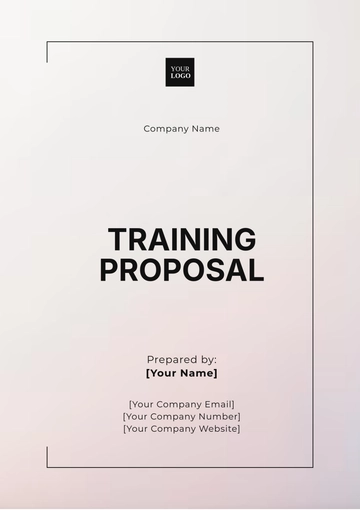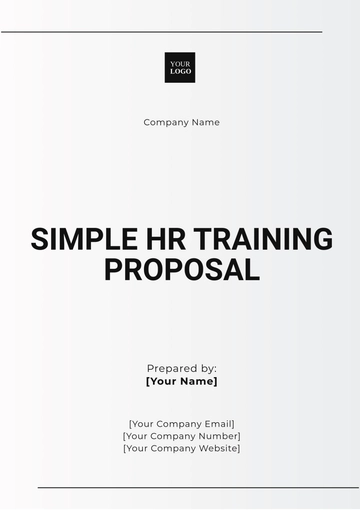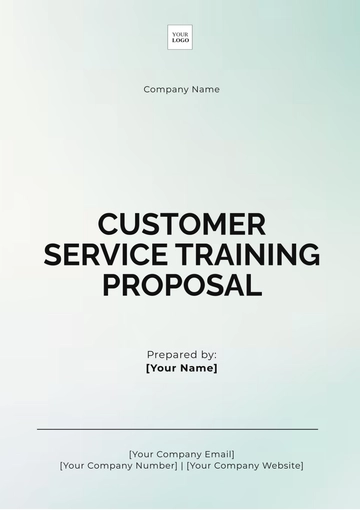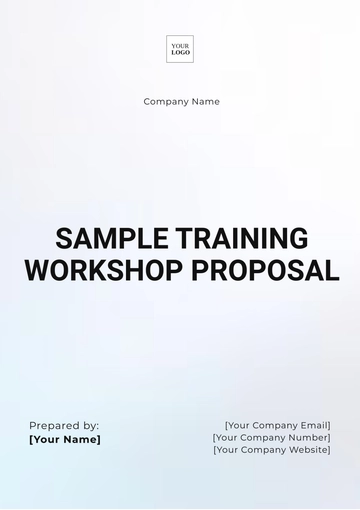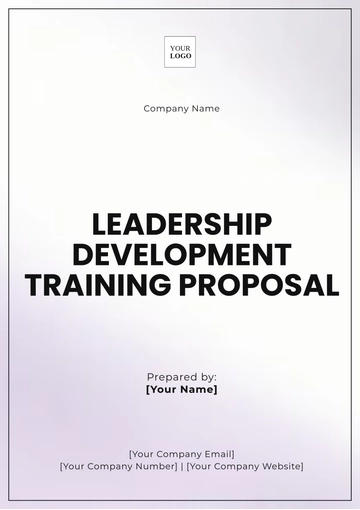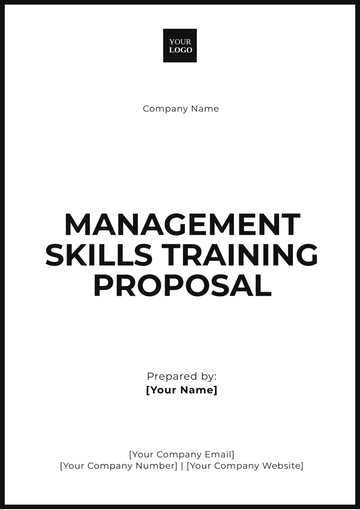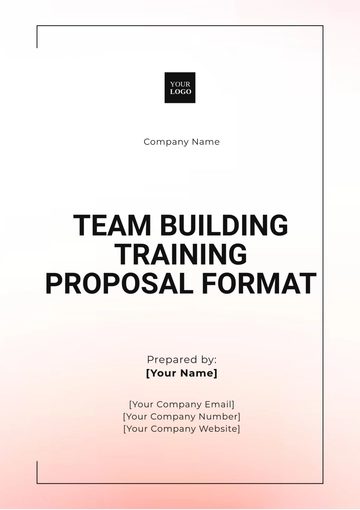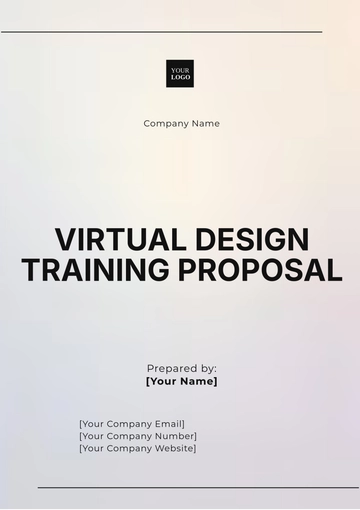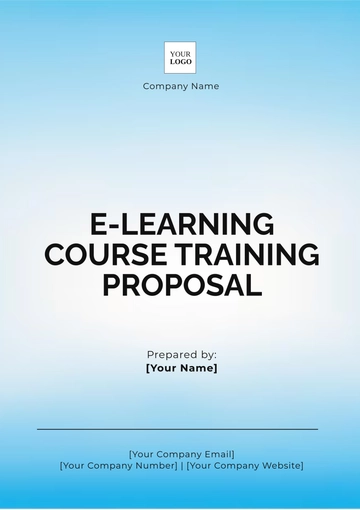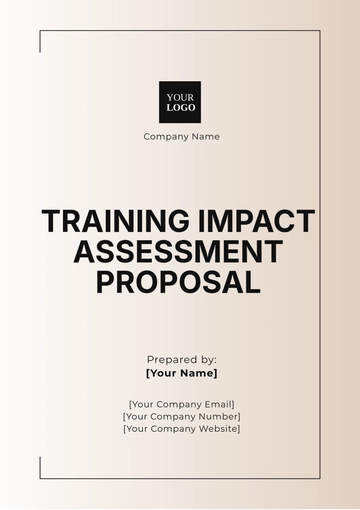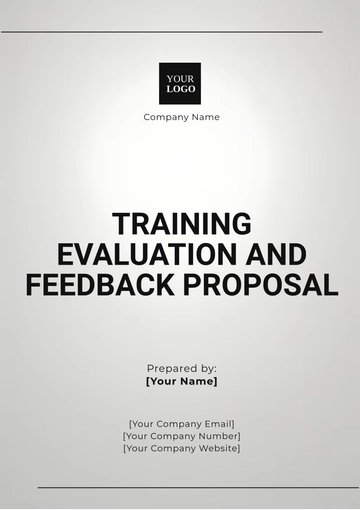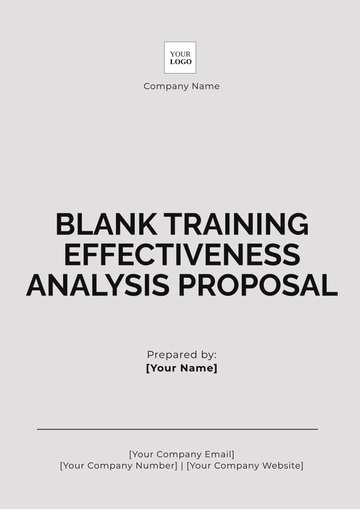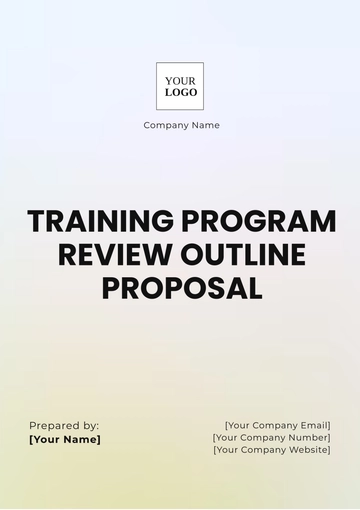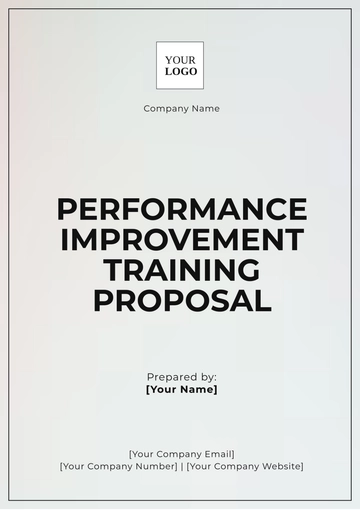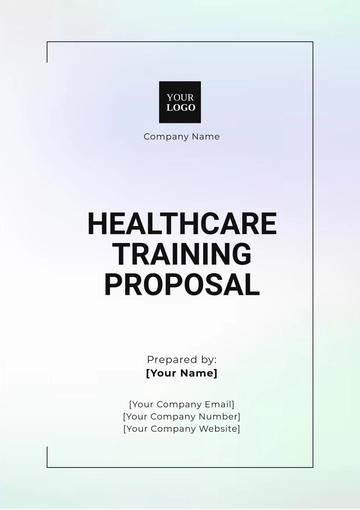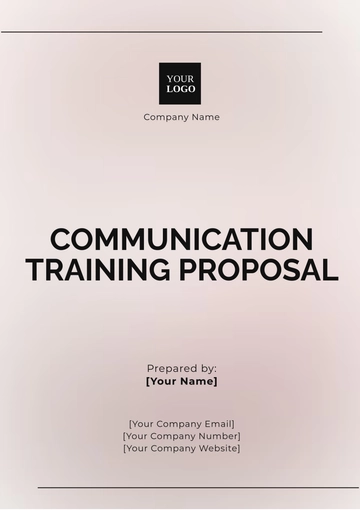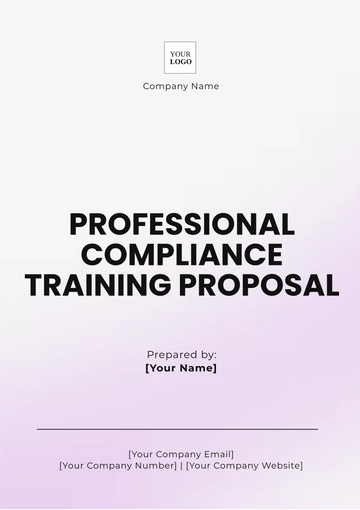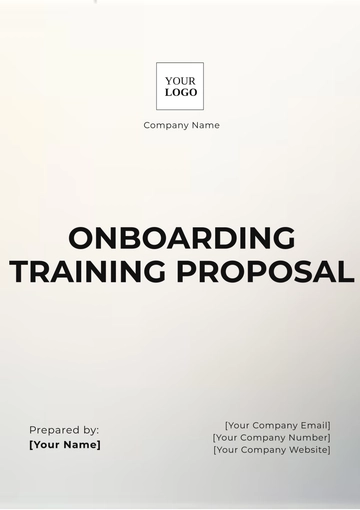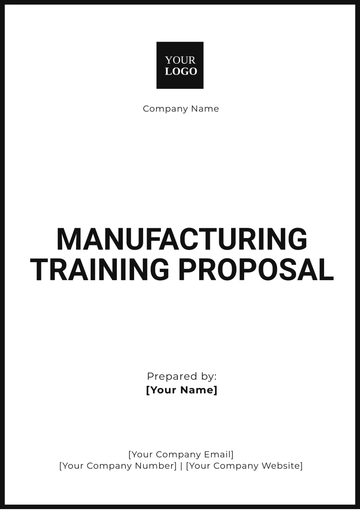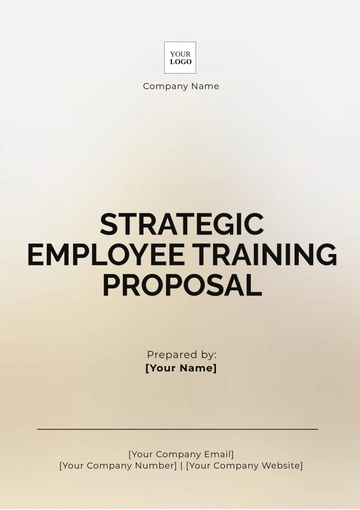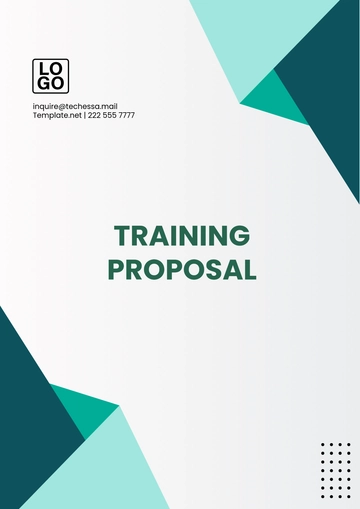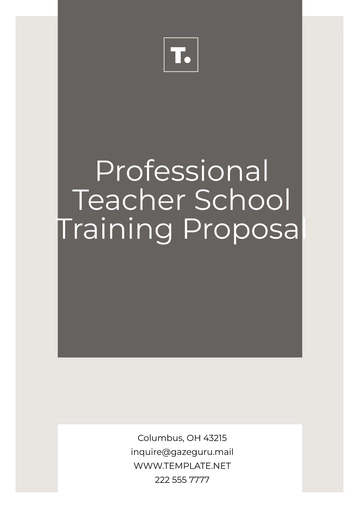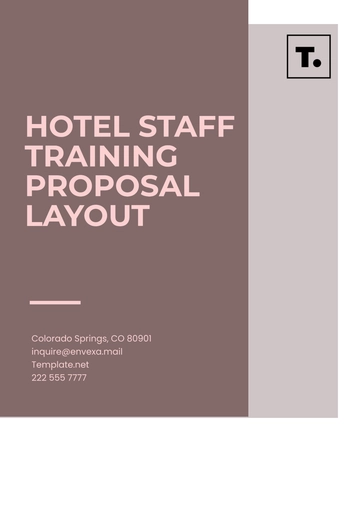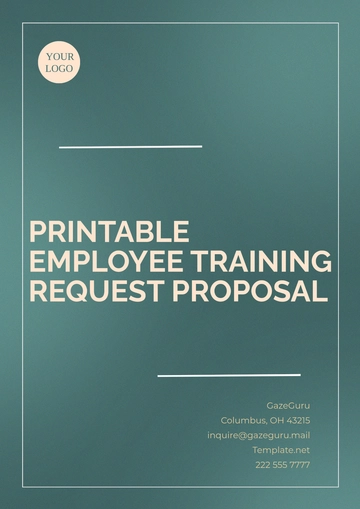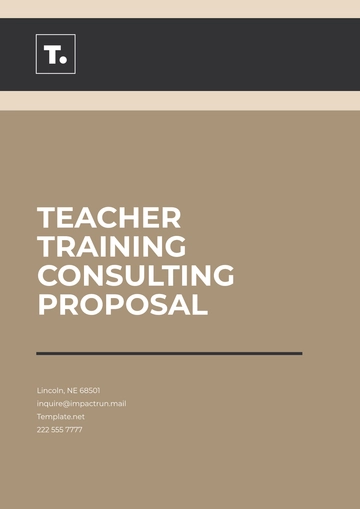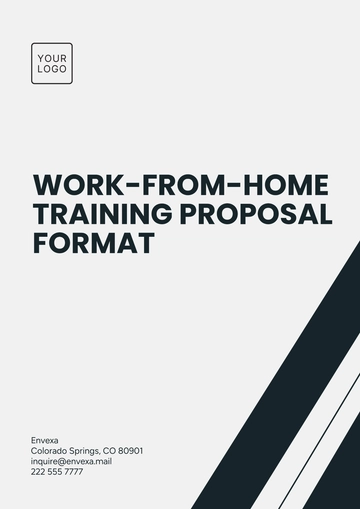Free Healthcare Training Proposal
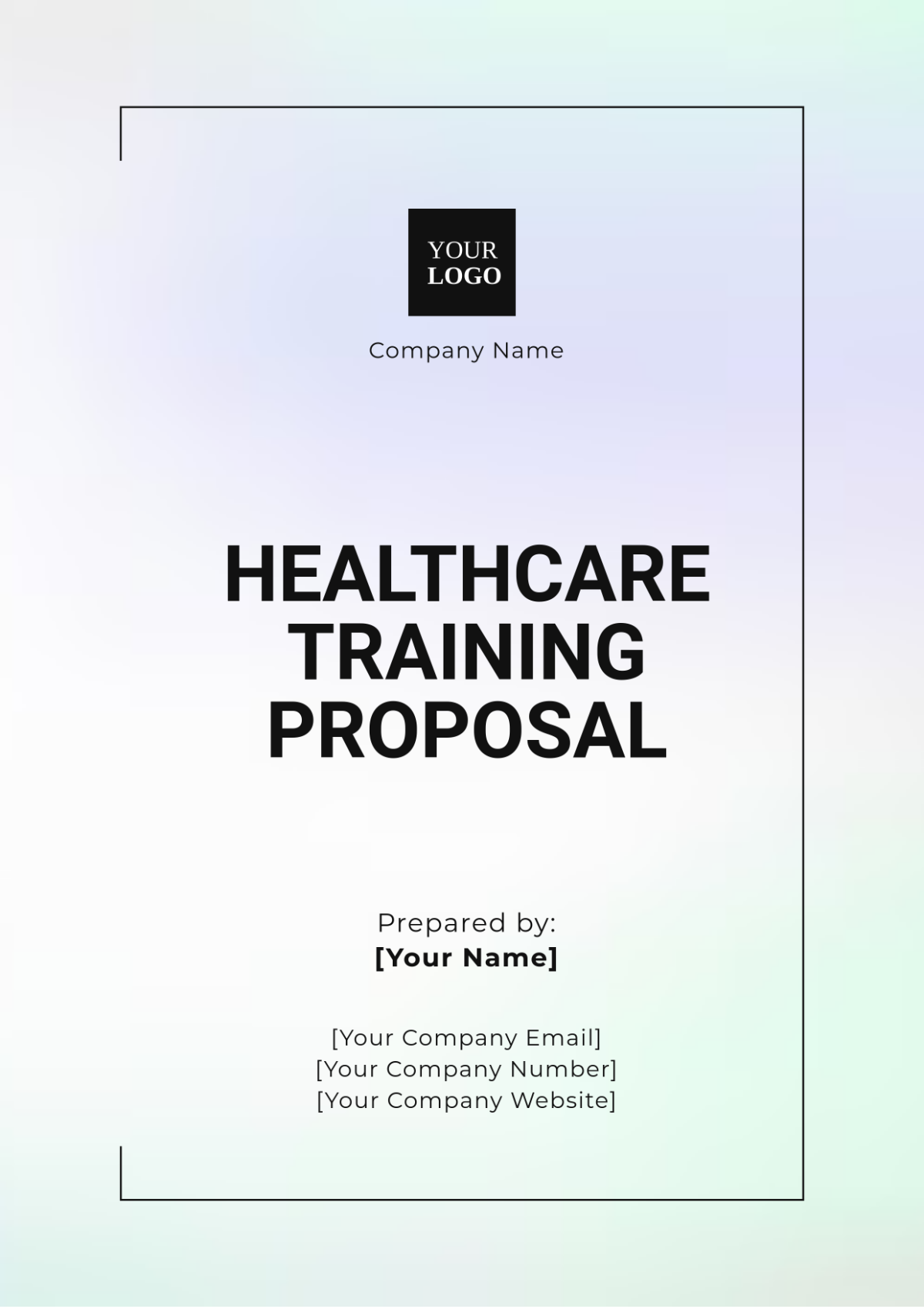
Prepared by: [Your Name]
Company: [Your Company Name]
Date: [Date]
I. Executive Summary
This Healthcare Training Proposal outlines a comprehensive plan to enhance the skills and knowledge of healthcare professionals within our organization. The proposed training programs are designed to boost compliance, promote best practices, and improve patient outcomes. Spanning various healthcare disciplines, the training will cover both theoretical and practical components to ensure a well-rounded and impactful learning experience. This proposal emphasizes the need for ongoing development in clinical expertise, regulatory compliance, and the adoption of cutting-edge healthcare technologies.
By the end of the training, we aim to achieve measurable improvements in staff performance, patient satisfaction, and overall operational efficiency.
II. Training Objectives
A. Enhance Clinical Skills
The primary objective is to improve the competency and proficiency of healthcare staff in clinical areas. This will be achieved through specialized training modules focused on advanced patient care procedures, diagnostics, and management strategies. The training will offer hands-on experience, equipping healthcare providers with the skills needed to respond effectively to diverse medical scenarios.
B. Update Knowledge Base
Keeping healthcare professionals up to date is vital. This training aims to integrate the latest research findings, medical innovations, and technological advances into the everyday practice of our healthcare team. By staying abreast of current developments, staff will be better equipped to make informed decisions, adopt new treatments, and optimize patient care.
C. Strengthen Compliance
Compliance is crucial in healthcare to minimize risk and ensure patient safety. This training will ensure that all personnel are aware of and adhere to current regulations, legal requirements, and ethical standards. By focusing on regulatory changes and best practices, the program will help reduce errors, avoid legal liabilities, and improve the overall quality of care.
III. Training Content
The training program will consist of three core modules designed to address the specific needs of our healthcare staff.
Module | Description |
|---|---|
Clinical Skills Enhancement | In-depth training on advanced procedures, diagnostics, patient care strategies, and new treatment protocols. These sessions will help healthcare professionals refine their clinical abilities, ultimately improving patient outcomes. |
Regulatory Compliance | Workshops focused on the latest healthcare regulations, legal frameworks, and ethical practices. This module aims to strengthen compliance across the organization and reduce risk exposure. |
Technology Integration | Sessions that explore cutting-edge healthcare technologies, such as electronic health records (EHR), telemedicine, and medical devices. The focus will be on how to incorporate these tools into daily workflows for enhanced efficiency. |
IV. Methodology
A. Blended Learning Approach
To accommodate varying schedules and learning preferences, we will adopt a blended learning model that combines online and in-person sessions. The online components will focus on theoretical knowledge, while in-person workshops will provide practical, hands-on experience.
B. Interactive Workshops
Workshops will be a key part of the training methodology, featuring scenario-based learning, group discussions, and role-playing exercises. These interactive sessions are designed to engage participants actively, fostering teamwork and practical problem-solving skills.
C. Continuous Assessment
To ensure participants are absorbing the material, regular assessments will be conducted. Quizzes, assignments, and feedback sessions will track progress throughout the program, allowing for timely interventions and support when necessary.
V. Target Audience
The training program is designed to cater to a wide range of healthcare professionals, ensuring that each group receives tailored instruction according to their specific roles.
Doctors: Focused on advanced clinical practices and patient management.
Nurses: Emphasis on patient care techniques, medication administration, and compliance.
Healthcare Administrators: Training on regulations, compliance, and the integration of new technologies.
Technicians: Specialized sessions on using and maintaining healthcare equipment and tools.
VI. Timeline
The proposed training program will be rolled out over six months, with each module lasting approximately four weeks. Below is the breakdown:
Month 1-2: Clinical Skills Enhancement
Month 3-4: Regulatory Compliance
Month 5-6: Technology Integration
The structure allows for flexibility in scheduling and ensures sufficient time for both theoretical and practical learning.
VII. Budget
The estimated budget for this training program is outlined below. These costs include trainer fees, materials, and facility rentals.
Item | Cost |
|---|---|
Trainer Fees | $15,000 |
Materials and Resources | $5,000 |
Facility Rentals | $2,000 |
Additional expenses, such as travel costs for trainers or supplementary training tools, may be factored into the final budget upon approval.
VIII. Evaluation Plan
A. Pre and Post-Training Assessments
Participants will undergo evaluations before and after each module to measure knowledge gain and skill improvement. These assessments will be designed to reflect real-world healthcare challenges, ensuring that the training applies to day-to-day operations.
B. Feedback Collection
Regular feedback will be solicited from participants throughout the training process. This feedback will help us assess the effectiveness of the training and make necessary adjustments to future sessions. We will also use surveys and focus groups to gauge participant satisfaction.
C. Outcome Tracking
After the training, we will track the application of newly acquired skills and knowledge in the workplace. Performance metrics, such as patient outcomes, staff compliance, and operational efficiency, will be monitored to assess the long-term impact of the training.
IX. Conclusion
This healthcare training proposal aims to enhance the capabilities of healthcare professionals within our organization, ensuring they are equipped to meet the evolving challenges of the healthcare sector. By integrating a combination of clinical skills development, compliance education, and technological training, this program will not only improve staff performance but also elevate the quality of patient care.
Through a strategic and structured approach, we are confident that this training will foster a culture of continuous improvement and excellence within our healthcare system.
- 100% Customizable, free editor
- Access 1 Million+ Templates, photo’s & graphics
- Download or share as a template
- Click and replace photos, graphics, text, backgrounds
- Resize, crop, AI write & more
- Access advanced editor
Improve healthcare practices with the Healthcare Training Proposal Template from Template.net. This editable and customizable template is designed for proposing training programs in healthcare settings, covering key areas such as compliance, patient care, and medical procedures. Adapt it for any healthcare institution, and quickly make edits with the editable in our AI Editor Tool for efficient customization.
You may also like
- Business Proposal
- Research Proposal
- Proposal Request
- Project Proposal
- Grant Proposal
- Photography Proposal
- Job Proposal
- Budget Proposal
- Marketing Proposal
- Branding Proposal
- Advertising Proposal
- Sales Proposal
- Startup Proposal
- Event Proposal
- Creative Proposal
- Restaurant Proposal
- Blank Proposal
- One Page Proposal
- Proposal Report
- IT Proposal
- Non Profit Proposal
- Training Proposal
- Construction Proposal
- School Proposal
- Cleaning Proposal
- Contract Proposal
- HR Proposal
- Travel Agency Proposal
- Small Business Proposal
- Investment Proposal
- Bid Proposal
- Retail Business Proposal
- Sponsorship Proposal
- Academic Proposal
- Partnership Proposal
- Work Proposal
- Agency Proposal
- University Proposal
- Accounting Proposal
- Real Estate Proposal
- Hotel Proposal
- Product Proposal
- Advertising Agency Proposal
- Development Proposal
- Loan Proposal
- Website Proposal
- Nursing Home Proposal
- Financial Proposal
- Salon Proposal
- Freelancer Proposal
- Funding Proposal
- Work from Home Proposal
- Company Proposal
- Consulting Proposal
- Educational Proposal
- Construction Bid Proposal
- Interior Design Proposal
- New Product Proposal
- Sports Proposal
- Corporate Proposal
- Food Proposal
- Property Proposal
- Maintenance Proposal
- Purchase Proposal
- Rental Proposal
- Recruitment Proposal
- Social Media Proposal
- Travel Proposal
- Trip Proposal
- Software Proposal
- Conference Proposal
- Graphic Design Proposal
- Law Firm Proposal
- Medical Proposal
- Music Proposal
- Pricing Proposal
- SEO Proposal
- Strategy Proposal
- Technical Proposal
- Coaching Proposal
- Ecommerce Proposal
- Fundraising Proposal
- Landscaping Proposal
- Charity Proposal
- Contractor Proposal
- Exhibition Proposal
- Art Proposal
- Mobile Proposal
- Equipment Proposal
- Student Proposal
- Engineering Proposal
- Business Proposal
